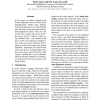Free Online Productivity Tools
i2Speak
i2Symbol
i2OCR
iTex2Img
iWeb2Print
iWeb2Shot
i2Type
iPdf2Split
iPdf2Merge
i2Bopomofo
i2Arabic
i2Style
i2Image
i2PDF
iLatex2Rtf
Sci2ools
100
click to vote
COLING
2008
2008
On Robustness and Domain Adaptation using SVD for Word Sense Disambiguation
In this paper we explore robustness and domain adaptation issues for Word Sense Disambiguation (WSD) using Singular Value Decomposition (SVD) and unlabeled data. We focus on the semi-supervised domain adaptation scenario, where we train on the source corpus and test on the target corpus, and try to improve results using unlabeled data. Our method yields up to 16.3% error reduction compared to state-of-the-art systems, being the first to report successful semi-supervised domain adaptation. Surprisingly the improvement comes from the use of unlabeled data from the source corpus, and not from the target corpora, meaning that we get robustness rather than domain adaptation. In addition, we study the behavior of our system on the target domain.
COLING 2008 | Computational Linguistics | Domain Adaptation | Semi-supervised Domain Adaptation | Unlabeled Data |
Related Content
| Added | 29 Oct 2010 |
| Updated | 29 Oct 2010 |
| Type | Conference |
| Year | 2008 |
| Where | COLING |
| Authors | Eneko Agirre, Oier Lopez de Lacalle |
Comments (0)

